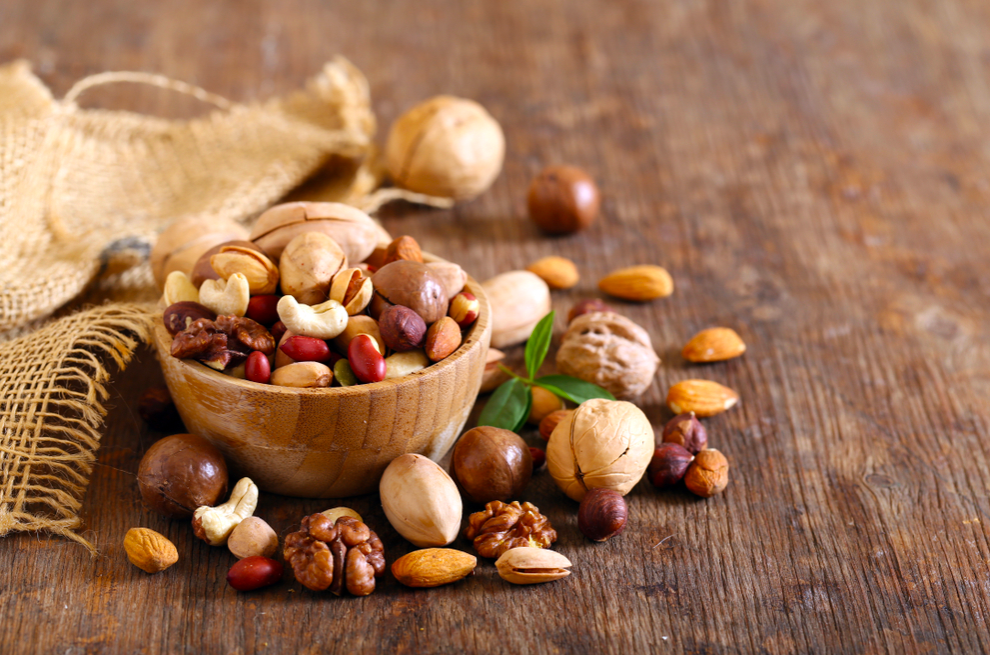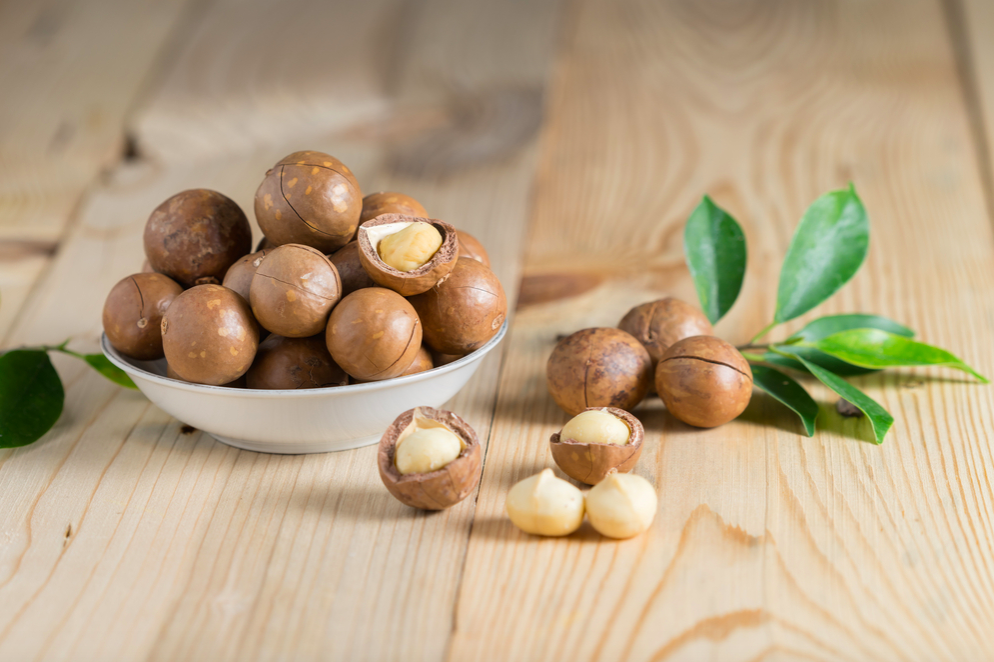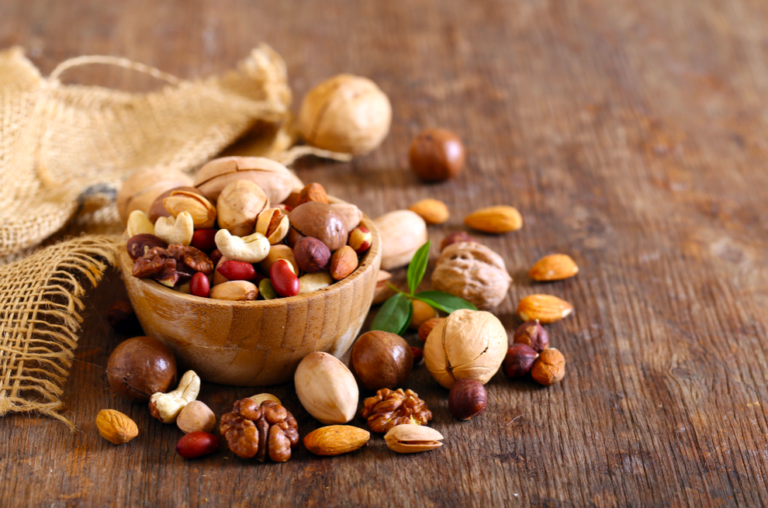Pregnancy is a time when parents are always worried about their child’s nutrition. Sometimes, due to lack of understanding, many people think that they have to eat a lot during pregnancy to provide enough nutrients for their baby. However, not all foods are suitable for pregnant women, as they can potentially endanger the baby.
Benefits of Nuts for Pregnant Women
Eating nuts during pregnancy can improve a baby’s cognitive abilities later in life. If a mother eats about 56-85g of nuts per week during pregnancy, her baby will have better memory and concentration, as well as improved IQ scores.
Adding a variety of nuts to a pregnant woman’s daily diet also helps reduce the child’s food allergies when they grow up.
Some nutrients found in nuts, such as protein, fiber, unsaturated fats, omega-3s, and L-arginine, are valuable in supplementing nutrition for pregnant women and supporting fetal development.

Nutritious Nuts Recommended for Pregnant Women
Walnuts
Topping the list of nuts recommended for pregnant women are walnuts. These nuts are packed with nutrients such as vitamin E, omega-3s, phosphorus, and especially organic acids that help develop the baby’s brain and intelligence from within the womb. Pregnant women are advised to eat 6-8 walnuts a day for a smart and agile baby.
Pumpkin Seeds
Not only are pumpkin seeds good for the fetal brain development, but they are also beneficial for the kidneys and stomach. They help stop bleeding, promote bowel movements, and help reduce the risk of depression and promote a relaxed and clear mind during pregnancy.
Almonds
Rich in Omega-3 and folate, which are essential for pregnant women and an indispensable source of nutrients for the fetus.
Macadamia Nuts
Macadamia nuts have a very high content of fat, protein, mineral salts, vitamin B6, calcium, iron, and phosphorus, which pregnant women should also supplement during pregnancy.

Chestnuts
Chestnuts are rich in calcium, protein, fat, iron, zinc, phosphorus, and vitamins. These substances are beneficial for the development of bones, muscles, and blood circulation for pregnant women. Eating chestnuts also helps reduce fatigue and bone and joint pain during pregnancy.
Chia Seeds
Chia seeds are the leading source of omega-3 fatty acids among the nuts recommended for pregnant women. 100g of chia seeds contain 8 times more omega-3 than salmon. Chia seeds also contain a lot of folic acid, which plays an important role in preventing neural tube defects in the fetus. Pregnant women should eat 1-2 tablespoons of chia seeds per day to fully enjoy the benefits of this type of seed.
Nuts Pregnant Women Should Avoid
Most nuts are benign and have health benefits for pregnant women. However, there are some nuts that pregnant women should avoid because they can cause unwanted side effects when consumed in excess, especially during the first trimester.
Coix Seeds (Job’s Tears) are among the nuts pregnant women should avoid
Coix seeds are an ingredient in delicious dishes such as porridge and soup, and have the effect of nourishing the body and treating some diseases related to the digestive system. However, if pregnant women eat too many coix seeds, there is a risk of uterine contractions, which can easily lead to danger for the safety of the fetus.
Sunflower Seeds
Sunflower seeds are on the list of nuts that pregnant women should not eat. These seeds are nutritious, but pregnant women should not eat too many because of the risk of overheating the body and poisoning. Specifically:
If pregnant women eat sunflower seed shells, they are prone to constipation. Eating too many sunflower seeds can cause diarrhea, abdominal pain, and dizziness.
Sunflowers can cause allergies in pregnant women with sensitive skin or a history of nut allergies.
Eating too many sunflower seeds can cause skin diseases and make hair and nails brittle and easily broken.
The selenium in sunflowers, when accumulated in large amounts, can lead to uncomfortable symptoms, fatigue, and vomiting.
Anyone who eats too many sunflower seeds is at risk of phosphorus poisoning, which is harmful to the kidneys. This toxicity comes from the plant absorbing active substances in the soil, transporting them to the flower, and accumulating them in the seeds.
Some Precautions When Consuming Nuts
Nuts should be stored in airtight containers in a cool place or in the refrigerator.
Limit consumption of processed nuts such as those fried in oil or roasted with salt.
Eat nuts in moderation. Eating too many nuts in a day will make pregnant women feel full and unable to eat other foods, which can easily lead to nutrient deficiencies and nutritional imbalances.
Pregnant women should note that some nuts are not recommended during the first months of pregnancy to avoid risks.
If you experience any signs of allergy or abdominal pain, nausea, or dizziness after eating nuts, you should stop eating and go to the hospital for a check-up.
Pregnant women with a history of nut allergies should be cautious when eating this type of food.
This article has provided readers with information about the foods pregnant women should eat and at the same time a list of foods and nuts that pregnant women should not eat during pregnancy. Hopefully, this will help you protect your health and the health of your fetus in the best way.
See more>> Diet for pregnant women to avoid weight gain, baby develops comprehensively
.tdi_44.td-a-rec {
text-align: center;
}
.tdi_44 .td-element-style {
z-index: -1;
}
.tdi_44.td-a-rec-img {
text-align: left;
}
.tdi_44.td-a-rec-img img {
margin: 0 auto 0 0;
}
@media (max-width: 767px) {
.tdi_44.td-a-rec-img {
text-align: center;
}
}
“`

